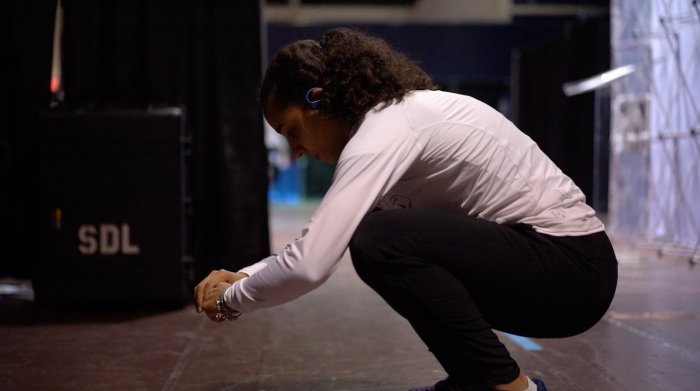One of the most frequently reported problems by many squash players, is their inability to achieve and maintain a consistent level of performance. That familiar and frustrating feeling of playing your best squash one day, and then walking on court for your next performance and feeling like you’ve never hit a ball before, is one that has affected most regular players at one time or another.
There are always certain things that you can’t exert any influence over in relation to your performance, but what you can do is ensure that you ‘control the controllable’ – one of the best ways of doing this, is to develop a ‘Pre-Performance Routine’.
Consistency in performance is something that every player of every sport strives for, but it can be a very difficult thing to achieve for many reasons. A lot of sportspeople forget that their performance isn’t totally reliant on just their conscious efforts – there are many other things that affect our performance levels, including environment (e.g. time of day, temperature, physical condition of the court), other people (e.g. poor refereeing, your opponent playing above expectations of their ability), and your own mind (e.g. residual stress from work/family).
All too often players neglect to consider these factors, however, and become too self-absorbed as to the roots of their performance consistency issues. Rarely do all of the stars align perfectly when it comes to performance, and there are always going to be things that affect us that we, unfortunately, can’t exert any influence over – recognising and understanding this is a first important step toward optimising the consistency of your performance.
 So while there are many things that we can’t control, on the flip side there are many things that we can control. One of the very best ways to put yourself in the best position to attain consistent performance is to first implement a consistent approach. Take time to consider what are the things you do before you play that tend to correlate with a good performance – what was the length/intensity of your warm-up? What did you eat/drink pre-match, and how long beforehand? What were you thinking about before the game and during the knock-up? Did you go in with pre-prescribed tactics, or did you ‘feel things out’ as you went?
So while there are many things that we can’t control, on the flip side there are many things that we can control. One of the very best ways to put yourself in the best position to attain consistent performance is to first implement a consistent approach. Take time to consider what are the things you do before you play that tend to correlate with a good performance – what was the length/intensity of your warm-up? What did you eat/drink pre-match, and how long beforehand? What were you thinking about before the game and during the knock-up? Did you go in with pre-prescribed tactics, or did you ‘feel things out’ as you went?
Taking time to consider all of these inter-related preparation elements (what you did, how you did it, when you did it), will allow you to start putting together a ‘Pre-Performance Routine’ – a set routine of preparation that you go through in readiness for any competitive match that you play.
Of course, there needs to be room for flexibility in your routine. You may arrive a little later than planned to your match venue, there may not be enough room for your usual warm-up, you may not have had time to eat your usual pre-match meal – it comes back to that ‘control the controllable’ phrase again however, and being ready to adapt the details within your overall framework (e.g. condensing your warm-up while still following the same basic structure, having provision for a ‘small space warm-up’ as a back-up, keeping some sports bars/dried fruit/healthy snacks in your car or sports bag to munch on if having had to miss your proper meal).
Over time, developing this pre-performance routine will allow you to establish consistency in your preparation, allowing you the best possible conditions to optimise your physical and mental performance, which in turn will start helping to put you in the best position to achieve that much sought-after consistency in your play.
For further reading into this area, there is a great feature at Psychology Today that looks at routines in more depth in relation to sports performance and discusses step-by-step how to go about constructing your own. Also, check out the article here that looks at some of the research and theory behind the concept of pre-performance routines.
Gary Nisbet
B.Sc.(Hons), CSCS, NSCA-CPT, Dip. FTST
SquashSkills Fitness & Performance Director
Watch: How To Improve Your Mental Toughness In Matches
In this series, Paul Assaiante explains everything you need to know to improve your mental toughness during matches.
Watch Now